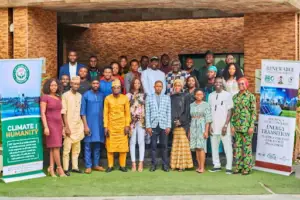Mr. Pius OKO, Executive Director of Ecosteward and Humanitarian Foundation (EHF) and Lift Humanity Foundation, opened the workshop by stressing the urgent need for a shift from fossil fuels to renewable energy sources. While Nigeria has committed to climate action through its Energy Transition Plan (ETP), the implementation has been slow in achieving its ambitious targets. The ETP aims to lift 100 million Nigerians out of poverty, ensure modern energy access, and promote economic growth, while also addressing job losses in the oil sector.
He emphasized that as a rapidly developing nation, Nigeria faces rising energy demands driven by its growing population and expanding economy. Renewable energy sources, such as solar, wind, and hydropower, offer a sustainable and cost-effective solution to meet these needs, while reducing reliance on finite fossil fuels. However, effective governance is crucial for the successful integration of renewables into Nigeria’s energy mix. Governance frameworks—encompassing policies, regulations, and institutions—play a pivotal role in either supporting or hindering renewable energy development. Therefore, assessing Nigeria’s current state of renewable energy governance is essential to identifying potential challenges and opportunities for improvement.
According to Mr. OKO, the workshop highlighted a policy brief that assessed renewable energy options in Nigeria based on factors such as cost, capacity, environmental impact, job creation, and security. The assessment revealed that energy efficiency and biomass currently represent the most economically viable renewable energy options for Nigeria, while solar, geothermal, wind, nuclear, and hydroelectric energy were considered less cost-effective. However, the findings suggest that despite initial investment advantages in energy efficiency and biomass, it is important to explore the potential of alternatives like solar, geothermal, and wind energy for long-term sustainability.
An open panel discussion, moderated by Lucky Abeng, EHF Policy and Research Director, focused on the implications of the policy brief. Stakeholders emphasized the need for ongoing engagement, media advocacy, funding, capacity building, political will, and involvement of sub-national governments in renewable energy governance. The session concluded with a strong call for collaboration among investors, the media, and associations to accelerate the adoption of renewable energy in Nigeria.
On the second day, the EHF team visited the Karu Local Government Legislative Chambers in Nasarawa State, where they engaged parliamentarians on renewable energy governance. Led by Program Director Emmanuel Nweze, the team underscored the importance of political commitment and policies to drive renewable energy initiatives. The LHF also presented a Memorandum of Understanding (MOU) to foster partnerships on renewable energy projects.
Ameedat Abdulsalam, EHF Project Manager, outlined the workshop’s objectives, including raising awareness of Nigeria’s current energy challenges and the benefits of energy democracy. The event underscored the vital role of civil society in bridging the gap between high-level policy discussions and practical solutions, contributing to energy democracy, poverty reduction, and environmental sustainability.

